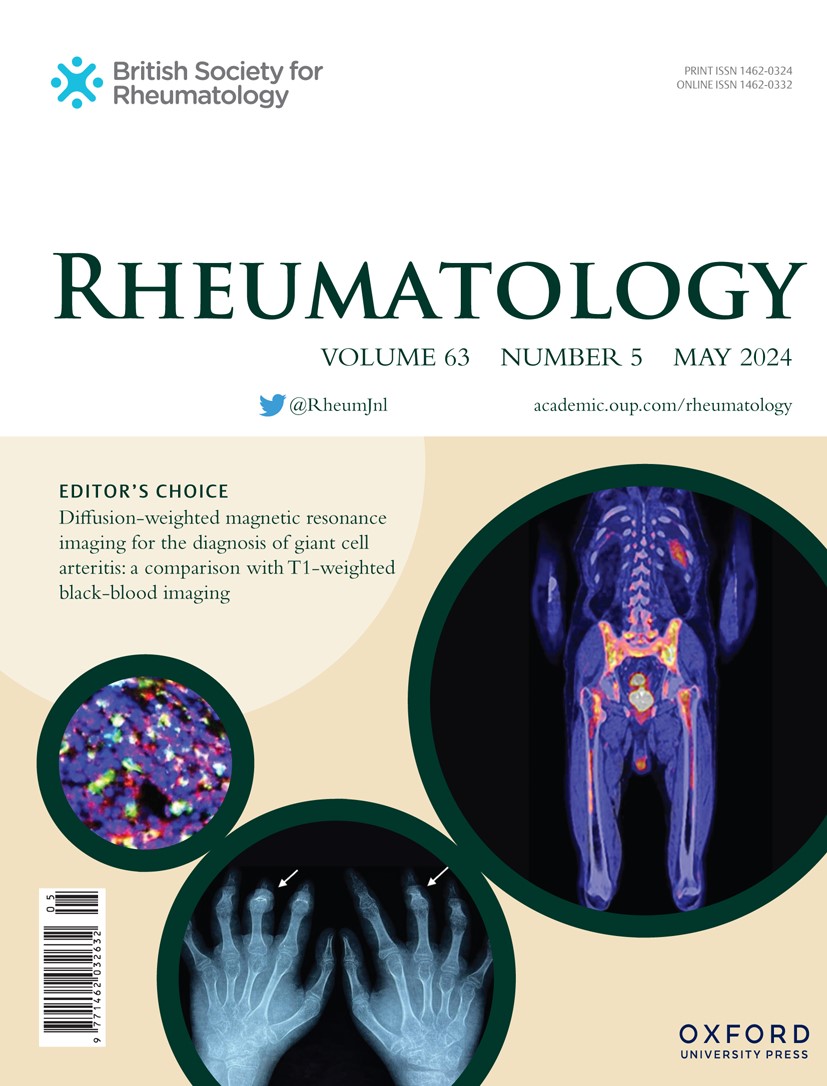贯穿儿科和青少年风湿病学的质量改进:JIA Learn经验
IF 4.7
2区 医学
Q1 RHEUMATOLOGY
引用次数: 0
摘要
背景/目的青少年特发性关节炎(JIA)是一种相对常见的慢性儿科疾病,具有显著的终身发病率。尽管医疗技术取得了重大进展,但“理想世界”(临床研究)和“现实世界”(临床实践)数据之间的持续差异表明,JIA的护理质量仍有改进的空间。此外,了解并优先考虑对儿童和家庭至关重要的结果将改善临床护理经验,并减少JIA对全球健康和福祉的影响。现代质量改进方法加速了复杂适应性卫生系统的改进,因为团队有权测试和调整流程以适应当地环境和人口。我们报告了2022年至2024年间英格兰儿科JIA护理质量改进的一种新颖的协作方法。健康改善研究所突破性系列合作模式为全英国学习系统(称为JIA Learn)的发展提供了信息,其目的是改善护理和结果,促进“社会联系”,并创造一种持久的改进文化。方法在2022年4月的介绍性活动之后,制定了共同目标和总体驱动图,鼓励参与团队在合作的积极阶段确定相关的本地改进项目。这次合作还包括三个正式的学习活动,三个虚拟的行动学习集,以及通过改进指导提供的个人或团队支持。鼓励参与小组在整个积极学习期间收集一套商定的核心措施。结果来自英国各地的12个团队参与了4个学习活动,平均满意度为9.8分。JIA Learn数据集,包括cJADAS10、JIA PROM和JIA PREM,收集了1320例离散患者就诊(87.3%可用数据),多个QI项目由参与团队在当地交付。改进的重点是及时获得护理、过渡性护理、患者途径、患者教育和与患者组织的当地工作。参与团队报告说,JIA Learn使他们能够创新,更有效地作为一个团队工作,整个MDT都可以学习。有限的时间和容量,没有数据收集的基础设施以及缓慢的Caldicott审批流程是及时改进的常见障碍。结论临床社区、BSR、RUBIS之间的合作关系。QI团队和参与JIA Learn的许多患者组织对项目的成功至关重要。这一合作重振了MDT成员对改进工作的适应能力和热情,提供了分享知识和学习的新机制,为一系列旨在提高临床护理质量和经验的地方项目提供了信息,并使儿科风湿病学团队成为一个自信和熟练的改进社区。随着时间的推移,保持临床信心和热情以及保持有效的伙伴关系将是确保改进工作遗留下来的关键。F.麦克莱恩:没有。G.克利里:没有。詹姆斯:没有。雷恩:没有。A. Burhouse:没有。本文章由计算机程序翻译,如有差异,请以英文原文为准。
OA36 Embedding quality improvement across paediatric and adolescent rheumatology: the JIA Learn experience
Background/Aims Juvenile idiopathic arthritis (JIA) is a relatively common chronic paediatric condition with significant potential for lifelong morbidity. Despite significant advances in medical treatment technologies, a persistent discrepancy between ‘ideal world’ (clinical research) and ‘real world’ (clinical practice) data suggests quality of care in JIA has room for improvement. Furthermore, understanding and prioritising the outcomes that matter to children and families will improve the experience of clinical care and reduce the impact of JIA on global health and well-being. Modern quality improvement approaches accelerate improvement in complex adaptive health systems because teams are empowered to test and adapt processes to suit local environments and populations. We report a novel and collaborative approach to quality improvement in paediatric JIA care across England between 2022 and 2024. The Institute for Health Improvement breakthrough series collaborative model informed development of a UK-wide learning system (termed JIA Learn) with the aim of improving care and outcomes, facilitating “social connectedness” and creating a lasting improvement culture. Methods Shared aims and an overarching driver diagram were developed following an introductory event in April 2022 with participating teams encouraged to identify related local improvement projects during the active phase of the collaborative. The collaborative included a further three formal learning events, three virtual action learning sets and individual or team support through improvement coaching. Participating teams were encouraged to collect the core set of agreed measures throughout the active learning period. Results 12 teams from across England engaged enthusiastically with the collaborative attending four learning events with an average satisfaction score of 9.8. The JIA Learn dataset, including the cJADAS10, JIA PROM and JIA PREM, was collected for 1320 discrete patient encounters (87.3% useable data) and multiple QI projects were delivered locally by participating teams. Improvements focussed on timely access to care, transitional care, patient pathways, patient education and local work with patient organisations. Participating teams reported that JIA Learn allowed them to innovate and work more effectively as a team, with learning accessible to the whole MDT. Limited time and capacity, no infrastructure for data collection and slow Caldicott approvals processes were common barriers to timely improvements. Conclusion The partnership between the clinical community, BSR, RUBIS.QI team and the many patient organisations involved in JIA Learn was central to the success of the project. The collaborative rejuvenated MDT members’ resilience and enthusiasm for improvement work, provided new mechanisms to share knowledge and learning, informed a range of local projects designed to improve the quality and experience of clinical care, and empowered paediatric rheumatology teams to become a confident and skilled community of improvers. Sustaining clinical confidence and enthusiasm as well as maintaining effective partnerships over time will be key to ensuring a legacy of improvement work. Disclosure F. McErlane: None. G. Cleary: None. N. James: None. A. Raine: None. A. Burhouse: None.
求助全文
通过发布文献求助,成功后即可免费获取论文全文。
去求助
来源期刊

Rheumatology
医学-风湿病学
CiteScore
9.40
自引率
7.30%
发文量
1091
审稿时长
2 months
期刊介绍:
Rheumatology strives to support research and discovery by publishing the highest quality original scientific papers with a focus on basic, clinical and translational research. The journal’s subject areas cover a wide range of paediatric and adult rheumatological conditions from an international perspective. It is an official journal of the British Society for Rheumatology, published by Oxford University Press.
Rheumatology publishes original articles, reviews, editorials, guidelines, concise reports, meta-analyses, original case reports, clinical vignettes, letters and matters arising from published material. The journal takes pride in serving the global rheumatology community, with a focus on high societal impact in the form of podcasts, videos and extended social media presence, and utilizing metrics such as Altmetric. Keep up to date by following the journal on Twitter @RheumJnl.
 求助内容:
求助内容: 应助结果提醒方式:
应助结果提醒方式:


